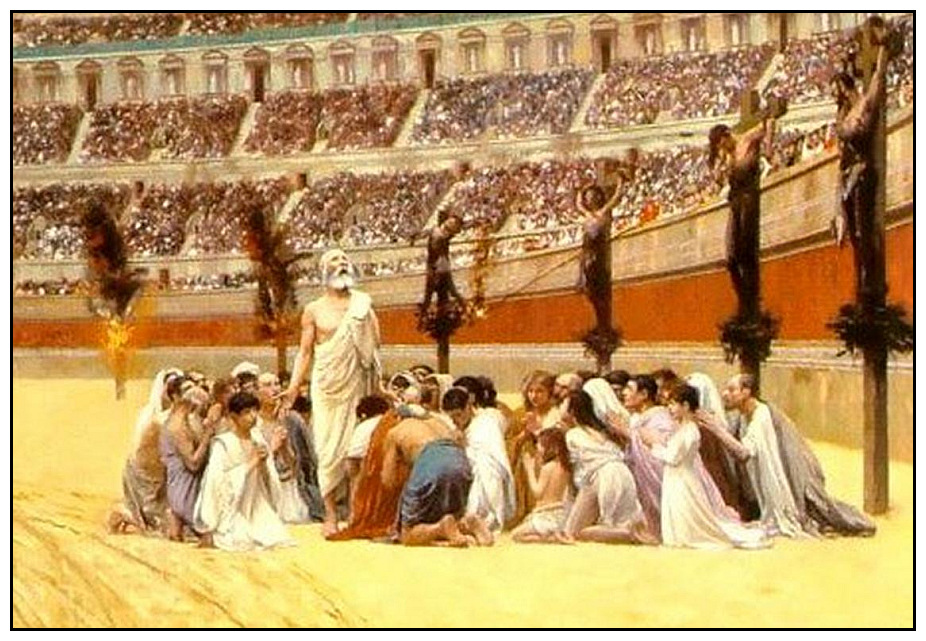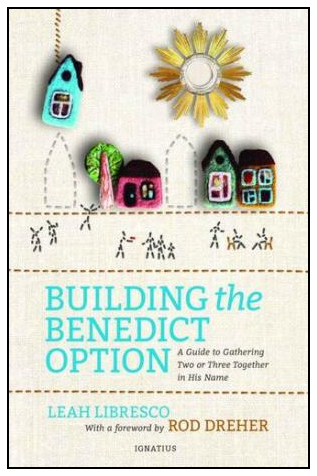THE FIRST CHRISTIANS WERE NOT LIKE THOSE WHO CAME LATER
 To eloquently bemoan the fact that Christianity has matured over the centuries is merely to belabor the obvious. The Church is Christ's bride: is a 79-year-old wife the same person as when she was a 21-year-old bride? Of course Christian teaching and practice have grown and matured with time and experience. There have been clarifications by the Church Fathers, but there have also been errors and even heresies. The danger lies in going to extremes. That's how heresies arise.
To eloquently bemoan the fact that Christianity has matured over the centuries is merely to belabor the obvious. The Church is Christ's bride: is a 79-year-old wife the same person as when she was a 21-year-old bride? Of course Christian teaching and practice have grown and matured with time and experience. There have been clarifications by the Church Fathers, but there have also been errors and even heresies. The danger lies in going to extremes. That's how heresies arise.
Some people say, for example – “Neither the New Testament nor the writings of early Christians support the idea that material wealth is intrinsically evil.” But neither is wealth intrinsically good, because acquiring wealth so often leads to the passion of greed or covetousness. The Lord Jesus Christ taught in the Sermon on the Mount:
"Do not lay up for yourselves treasures on the earth, where moth and rust consume, and where thieves break through and steal; but lay up for yourselves treasures in heaven, where neither moth nor rust consume, and where thieves don't break through and steal; for where your treasure is, there your heart will be also. The lamp of the body is the eye. If therefore your eye is sound, your whole body will be full of light. But if your eye is evil, your whole body will be full of darkness. If therefore the light that is in you is darkness, how great is the darkness! No one can serve two masters, for either he will hate the one and love the other; or else he will be devoted to one and despise the other. You cannot serve both God and Mammon" (Mat. 6:19-24 WEB).
Christ condemns here the desire for ever more and more earthly treasures, the accumulation of material wealth for its own sake. St. John explains “the evil eye” to be “the lust of the eyes” which is greed or covetousness. And our Lord teaches us here that we can't serve or worship both God and Mammon, material wealth. The desire for ever more wealth is worship of a false god, and is incompatible with worship of the true God.
The Apostle Paul in Eph. 5:2-5 states against covetousness:
“Walk in love, even as Christ also loved you, and gave himself up for us, an offering and a sacrifice to God for a sweet-smelling fragrance. But sexual immorality, and all uncleanness, or covetousness, let it not even be mentioned among you, as becomes saints; nor filthiness, nor foolish talking, nor jesting, which are not appropriate; but rather giving of thanks. Know this for sure, that no sexually immoral person, nor unclean person, nor covetous man, who is an idolater, has any inheritance in the Kingdom of Christ and God.”
Here St. Paul contrasts living by the law of love against living by the passions of lust and greed. He includes “covetousness” along with sexual immorality as sins that exclude a person from the Kingdom of God. The Apostle even equates covetousness with idolatry, reflecting the incompatibility of worshiping both God and Mammon. So it isn't too great a stretch for Dr. Hart to state that the accumulation of wealth is intrinsically evil. My own experience teaches me it is extremely difficult to relate to wealth altruistically and without any attraction to it or desire to acquire more and more wealth. As Christ said of the rich young ruler: “How hard it is for those who have wealth to enter the Kingdom of God.”
It is an anachronism to use the word “communism” to describe Acts 6:1-6, the story of how the needy among the first Christians were not being equally served. So the Apostles ordained the first deacons to manage the distribution of all donations, and we never again hear of the early Christians possessing "all things in common.” because the Greek word koinos for “common” is used in Acts chapters 2 and 4, which is the root for the words “communism,” “community” and “communion.” But the modern connotation of “communism” is Soviet or Chinese Marxist socialism. Actually, Marxist doctrine does not teach that the stage of dialectical development reached in the USSR or China was communism, but only socialism. And even that was achieved by force of mass killings and confiscation of all private property, hardly anything like the early Christian community.
When we were living in the Udmurt Republic of Russia in 1993-96, the heart of its military-industrial complex, my first Udmurt language tutor told me of how her parents barely survived the Bolsheviks' collectivization. They owned a cow – just one cow – so they were considered “kulaks” (“fists”) who were holding tightly onto their private property. The Bolsheviks seized not only their cow, but also their house, furniture, clothing – everything. The only item they were allowed to keep other than the clothes on their backs was one blanket wrapped around the elderly and sick grandmother. My tutor's daughter, by the way, was our first convert there and is now a missionary.
The Acts 2-6 attempt at communal living didn't work. This point is often overlooked in discussions about the Christian attitude toward material wealth. We can view Acts chapters 2 through 6 as the first steps of the baby Church in learning how to walk. In that sense, these chapters are historical and descriptive, but not normative and prescriptive. Later apostolic writings teach us to share our material goods with those in greater need. I emphasize the possessive pronoun “our” because the Apostles always use these pronouns which imply the right of having personal possessions. The question then remains: how do we relate to our possessions – do we own them, or do they own us? It is good and right if we own them as stewards to whom the Lord has entrusted a certain number of coins to use for His Kingdom. But it is evil if we either bury or misuse them for selfish purposes, not as a faithful steward: they are “ours” but only as trustees. Christ continued in the Sermon on the Mount by saying in Mat. 6:28-33 –
“Why are you anxious about clothing? Consider the lilies of the field, how they grow. They don't toil, neither do they spin, yet I tell you that even Solomon in all his glory was not dressed like one of these. But if God so clothes the grass of the field, which today exists, and tomorrow is thrown into the oven, won't he much more clothe you, you of little faith? Therefore don't be anxious, saying, 'What will we eat?', 'What will we drink?' or, 'With what will we be clothed?' For the Gentiles seek after all these things, for your heavenly Father knows that you need all these things. But seek first God's Kingdom, and his righteousness; and all these things will be given to you as well.”
Are the debaters about "communism in the early Church" actually just concerned about their future well-being to the extent of “laying up treasures for tomorrow”? Do they have vested retirement accounts? Do they have more raiment than the clothing on their backs? Do they have food stored up in their pantries? I would venture to guess that the answer is “yes” to all these questions. If so, then all their debates are merely tilting at windmills, much ado about nothing, mere empty intellectual exercises. Let us take seriously the words of the Gospel and put them into practice in our lives before we wax loquacious over them.
Go to ARC-News to read our free e-newsletters and Subscribe, or download this essay from https://agape-biblia.org/literatura/#1st-Christians, and share it!
